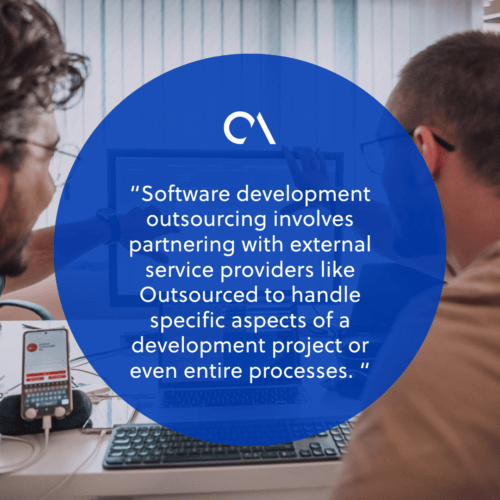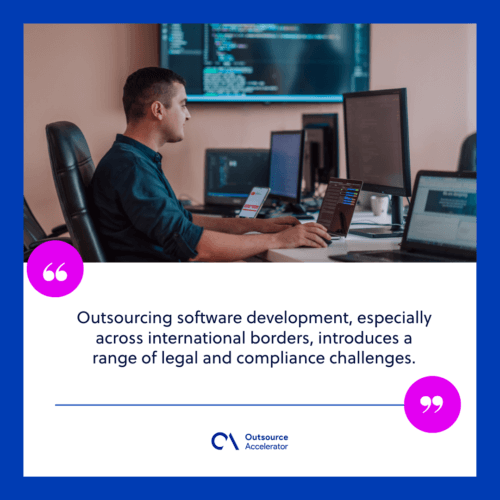4 common software development outsourcing challenges and how to navigate them

Software development outsourcing is a powerful strategy for businesses looking to scale operations, access specialized expertise, and save significantly on employment costs.
However, this approach isn’t without its complexities. Successfully navigating software development outsourcing challenges is crucial for ensuring smooth collaboration, timely delivery, and high-quality outcomes.
In this article, we’ll explore the basics of software development outsourcing and examine four of the most common challenges businesses face—along with actionable strategies to overcome them.
About software development outsourcing
Software development outsourcing involves partnering with external service providers like Outsourced to handle specific aspects of a development project or even entire processes.
Software development outsourcing can take many forms, from hiring dedicated developers to engaging full-service agencies. The approach varies based on project needs, budgets, and the desired level of involvement from the outsourcing partner.

Further, businesses choose this model to take advantage of the following benefits:
- Cost-effectiveness. Companies can save up to 70% on staffing costs by outsourcing to offshore teams.
- Faster project delivery. Outsourcing teams can work around the clock by leveraging time zone differences, ensuring faster turnaround times.
- Scalability. Outsourcing allows the scaling of teams up or down based on project demands.
- Access to the latest technologies. Outsourced teams stay updated on the latest technologies, eliminating the need for constant internal training.
4 Most common software development outsourcing challenges and how to navigate them
While software development outsourcing offers significant advantages, it also comes with its fair share of complexities.
From communication barriers to compliance issues, these software development outsourcing challenges can impact the success of your project if not carefully managed.
Let’s explore the four most common software development outsourcing challenges and provide actionable strategies to navigate them.
Software development outsourcing challenge #1: Communicate barriers
Effective communication is vital for successful outsourcing. However, differences in time zones, languages, and cultural nuances can create obstacles that lead to misunderstandings, delayed feedback, and missed deadlines.
These communication gaps often hinder collaboration and alignment between in-house teams and outsourcing partners, impacting overall project efficiency.
How to navigate this challenge:
Communication is a two-way street, and it’s better to overcommunicate than to leave things unclear. Try the following tips to overcome this challenge:
- Use collaboration tools. Leverage platforms like Slack, Microsoft Teams, or Zoom to ensure real-time communication.
- Establish overlapping work hours. Create a schedule with overlapping working hours to enable direct discussions and faster decision-making.
- Document everything. Clearly outline project requirements, instructions, and deadlines in writing.
- Set regular check-ins. Schedule regular check-ins and progress updates to maintain alignment and transparency.
Remember: If you’re not a mind reader, then neither are your outsourced staff! Clear, consistent communication is key to avoiding misunderstandings and ensuring alignment.
Software development outsourcing challenge #2: Data security risks
Outsourcing often involves sharing sensitive information, such as proprietary code or client data, with external teams.
Without proper safeguards, this poses risks of data breaches, intellectual property theft, or non-compliance with regulations.
How to navigate this challenge:
Protecting your data should be a top priority when working with an outsourcing partner. Here are key strategies to mitigate security risks:
- Ensure compliance with industry standards. Choose an outsourcing partner that adheres to recognized security frameworks, such as an ISO 270001 certification. This certification shows a BPO’s commitment to data protection and compliance.
- Use secure communication channels. Use encrypted communication and data sharing platforms, such as VPNs or secure file transfer services, to safeguard sensitive information.
- Implement NDAs and strong contracts. Draft comprehensive non-disclosure agreements (NDAs) and contracts that clearly define intellectual property rights and data protection responsibilities.
- Enforce access restrictions. Limit access to sensitive data on a need-to-know basis and use multi-factor authentication (MFA) to enhance account security.
Software development outsourcing challenge #3: Quality control and deliverables
Ensuring consistent quality in outsourced deliverables can be challenging, especially if the external team lacks direct oversight.
Quality issues can lead to project delays, increased costs, and outcomes that fall short of expectations. These will potentially jeopardize the success of your software development project.
How to navigate this challenge:
Establishing a robust framework for quality control is essential to ensure that your project meets the desired standards.
Here’s how to address this challenge effectively:
- Define clear quality benchmarks. Set clear quality benchmarks and milestones at the beginning of the project. This provides the team with clear goals to work towards.
- Conduct regular code reviews. Implement regular code reviews and quality assurance (QA) checks to catch and resolve issues early.
- Enforce open communication. Maintain open lines of communication to address quality concerns promptly and collaboratively.
By proactively managing quality control and deliverables, businesses can mitigate risks, reduce rework, and achieve high-quality outcomes that align with their project goals.
Software development outsourcing challenge #4: Legal and compliance issues
Outsourcing software development, especially across international borders, introduces a range of legal and compliance challenges.

These can include intellectual property (IP) protection, adherence to data protection regulations, and navigating differing labor laws. Ignoring these complexities can result in costly disputes, compliance violations, or reputational damage.
How to navigate this challenge:
Effectively managing legal and compliance issues requires a proactive and well-structured approach.
Here are key steps to mitigate risks:
- Engage legal experts. Work with legal experts to draft contracts that clearly outline ownership, confidentiality, and compliance requirements.
- Verify partner compliance. Ensure your outsourcing partner adheres to local regulations and industry standards.
- Revisit contracts. Regularly review and update contracts to reflect evolving legal and compliance needs, new business priorities, or changes in your outsourcing partnership.
Work with Outsourced.ph
In this day and age, outsourcing to trusted partners in the Philippines has become a proven strategy for companies of all sizes.
While software development outsourcing challenges are unavoidable, partnering with a reliable BPO provider like Outsourced can make the process easier.
With ISO certification and over 20 years of international management experience, Outsourced is more than capable of helping your business with its software development needs.
Ready to start your outsourcing journey? Visit their website or send an email to [email protected] today to learn more.







 Independent
Independent




